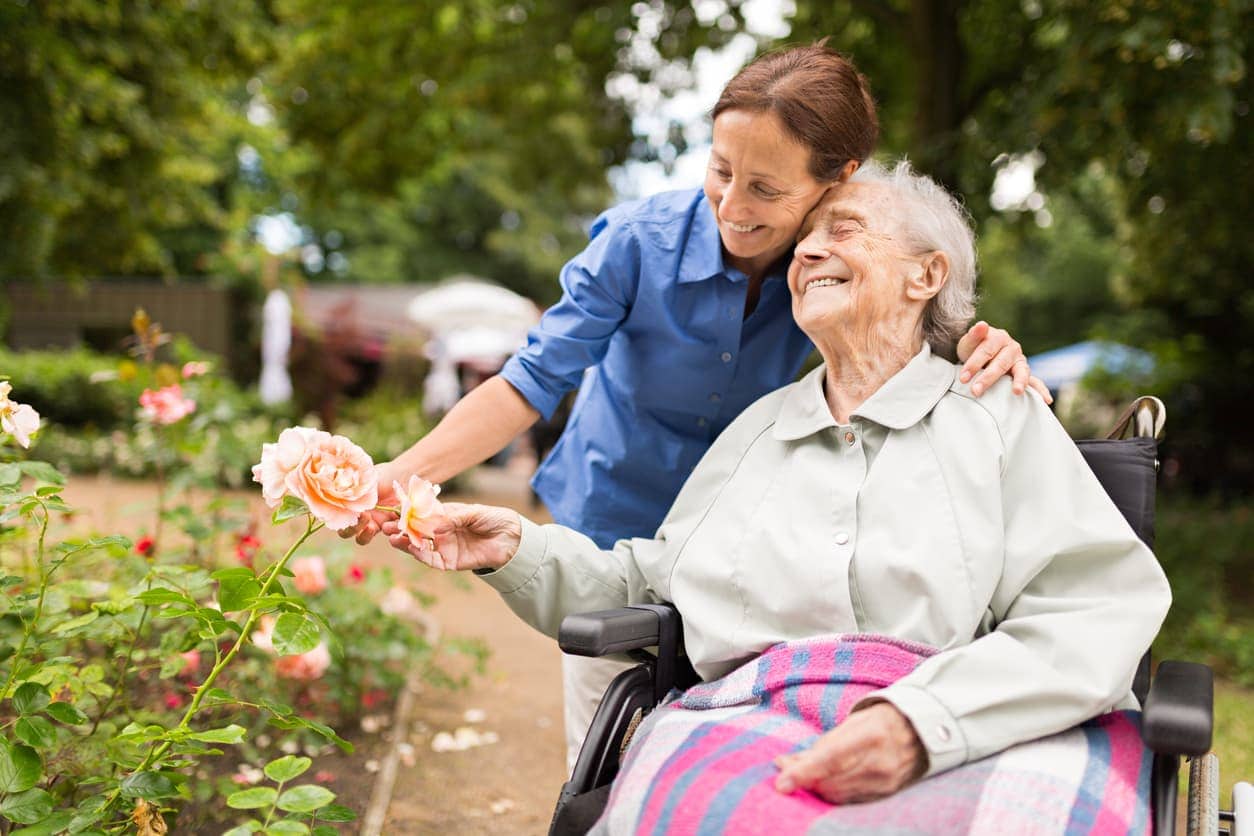
Caregiver’s Guide to Dementia
June is Alzheimer’s and Dementia Awareness Month. According to the Alzheimer’s Association, “worldwide, 50 million people are living with Alzheimer’s and other dementias.” As we raise awareness of those who are living with memory loss and brain issues, we also want to acknowledge the people who provide support and care for those with dementia each and every day.
Dementia and Memory Care: A Guide for Helpers
If you’re the primary caregiver of someone with memory loss, you’re not alone. In March 2021, helpguide.org reported that over 16 million people in the United States are taking care of someone with dementia or Alzheimer’s. In one year, caregivers will provide 18.5 billion hours of care. According to the Centers for Disease Control (CDC), “Approximately two-thirds of dementia caregivers are women, about one in three caregivers (34%) is age 65 or older, and approximately one-quarter of dementia caregivers are ‘sandwich generation’ caregivers, meaning that they care not only for an aging parent, but also for children under age 18.”
How to Care for Someone with Dementia
Being a caregiver to someone with memory loss can be deeply rewarding for both you and the person with dementia. However, it can also be stressful and emotional. As your loved one’s mental, emotional, and physical state deteriorates, it can take a toll on your own psyche and well-being. Many caregivers stop taking care of themselves in favor of spending more time and focus on their loved one. This can lead to caregivers developing anxiety, depression, and burnout. The CDC reported that 53% of caregivers “indicate that a decline in their health compromises their ability to provide care.” How can you take care of someone else while still taking care of yourself? Follow the below strategies on how to feel supported as you care for others.
Develop a Care Plan
Writing up a care plan for your loved one not only helps you organize all care details in one place, it can help you maintain a healthy life balance. You can start by filling out a Complete Care Plan form. This is a great and easy way to have the person’s medical information, including medications, insurance information, doctors’ contact info, and routines, and end of life care at your fingertips, should you need it.
Dealing with Common Behavior Mood Changes
The National Center for Biotechnology Information (NCBI) reported that “approximately 30% to 90% of patients with dementia suffer from behavioral disorders,” including depression, anxiety, psychosis, agitation, aggression, disinhibition, and sleep disturbances. Personality changes are most common and affect approximately 70% of patients. As a caregiver, it helps if you set the daily tone. Setting an example with a positive mood, using a pleasant sounding cadence to your voice, and using light physical touch can help make your loved one feel at ease. The person with dementia is more likely to mirror the tone you’re setting when they feel like they’re in a safe, calm and loving environment.
Connect with Your Patient
If you sense that your loved one is in distress, turn off all distracting noises and electronic devices like the television and radio. Turn off lights or close curtains. Sit down with your loved one and make eye contact. Speak to them in slow, short sentences in a low-toned voice. Try not to raise your voice in anger or frustration. Use your loved one’s name to connect and keep their attention. Try talking to them about their friends and family or recalling a happy memory.
If your loved one gets confused or agitated, respond with affection and reassurance. If the patient gets confused about where they are or what reality is, try not to convince them they are wrong. Instead, focus on their very real feelings and how they are perceiving reality in that moment. Let them know you are here with them, and they are safe. Sometimes holding hands or hugging can help solidify feelings of safety.
Ask Simple, Limited-Choice Questions
Instead of asking your patient, “What do you want to wear today?” narrow down their choice to a simple A or B answer. Try asking, “Do you want to wear the red shirt or blue shirt?” When you can, show your loved one the choices they have (physically pull the red and blue shirt out of the closet and hold them up, side by side) to make the decision easier.
Changes in Daily Living
What you and your loved one do on a daily basis may change after a dementia or Alzheimer’s diagnosis. More importantly, how you do tasks should change to assist your loved one and keep them at ease. Break down daily activities into smaller, easier steps. This makes things more manageable for you both. If the activity is eating a meal, place the utensils into your loved one’s hands if they get confused and patiently show them what they should do. If, when doing an activity, things become too much for your loved one (either they get frustrated, anxious, depressed, or angry) distract and redirect. Verbally acknowledge their feelings and then suggest an alternate activity: “I know you’re sad. I’m sorry about that. Let’s go take a walk.” Moving your loved one to a different environment or focusing them on a different task may help to lighten their mood.
How to Prevent Dementia Patients From Wandering
People with dementia and other memory loss disorders tend to wander for a variety of reasons. They could be simply looking for something or someone, or they could be bored and want to be elsewhere. Help your loved one not wander and get lost by making sure you incorporate exercise and fresh air into their daily routine. Consider adding “stop” or “do not enter” signs onto doors. You can change your doorknobs to require a key to enter and exit for the safety of your loved one. You can also try placing a black mat or painting a black section on either side of the door on the floor. This may make the floor appear impassable to someone with dementia. Have your loved one wear an alert bracelet that has their name and your contact information. Consider registering your loved one’s information and photo with the local police. Tell your neighbors about your situation, so if they ever see your loved one wandering outside without you, they’ll know to get them safely inside and alert you to where they are.
End-of-Life Care
There may come a point where you are taking care of a loved one with dementia near the end of their life. In the final stages, your loved one may not recognize you or know where they are. It may be a confusing and sad time for both of you. There are small things you can do to keep them comfortable during this time. Gentle touch may be a simple yet reassuring way of connecting. You can also create a playlist of music they like that can keep them happy and calm. Try to arrange the environment to keep the person comfortable–remove any loud or jarring noises and use curtains to lessen intrusive lighting. Each person with dementia is different, so their needs at this time will be different. Create a space that is best fitting to their needs.
How Caregiving Affects the Caregiver
Over half of caregivers express some signs of depression and anxiety. According to caregiver.org, most caregivers have lower self-acceptance because they spend most of their time doing for others and putting others first. Research done by Dr. P.P. Vitaliano and team, featured in Psychology and Aging, shows that caregivers with chronic stress are, ironically, “at a greater risk for cognitive decline including loss in short-term memory, attention and verbal IQ.” It may be difficult to do but take time to ground yourself and refresh your mind daily. Try meditation, taking a walk in nature, reading a book, practicing yoga, or taking a bath. Turn off electronics, close your eyes, and breathe. Disconnecting for even ten minutes a day and just being with yourself can help you release stress in a healthy way. Also seek help from a doctor or therapist to talk to during this time. Caregiving is a stressful role, and you deserve to have someone take care of you, too.
Do you need professional help for your loved one with memory loss?
Contact Avalon Memory Care. At Avalon Memory Care all of our focus and attention is on you and your loved one. Since 1995, our family has been dedicated to providing individualized, flexible and compassionate care for those with Alzheimer’s, dementia and other cognitive impairments, and their families. Avalon Memory Care has pioneered a unique model of care that is tailored to the individual special needs of those affected with Alzheimer’s disease, dementia and cognitive impairments in a safe and secure environment. Our comprehensive philosophy of care means that we attend to the physical, emotional, social and spiritual needs of each resident to ensure they achieve their full quality of life potential with individualized daily routines. Avalon Memory Care proudly serves those in the Dallas/Forth Worth area, Austin, San Antonio, and St. Louis areas, with more locations coming soon!
See More Articles
-
Visiting Your Aging Parent With Memory Loss at Avalon Memory Care
As a loving son or daughter, you naturally want the best of care for your senior parent. The compassionate assisted living caregivers at Avalon Memory Care want you to know that while your parent is living with us, he or she will receive nothing less than respectful, loving care within our comfortable, safe, and fully-staffed
-
Celebrating New Year’s Day in Memory Care
Families often find that celebrations with their loved ones in memory care are easier when they embrace new traditions. For instance, it may not be practical to expect your loved one to stay up until midnight on New Year’s Eve. Instead, consider throwing a New Year’s Day celebration, complete with a countdown to the first
-
Understanding Parkinson’s Disease and Dementia
Parkinson’s disease is an incurable neurological disorder, with progressively worsening complications. Perhaps the most well-known symptom of Parkinson’s is a hand tremor, but it can also cause speech changes, muscle rigidity, and impaired posture. Eventually, as the disease progresses, more than half of all individuals with Parkinson’s will require dementia care. This particular type of
Testimonials
Downloadable Resources
We Are Avalon
Discover the heart of our community; download ‘We Are Avalon’ to get to know our dedicated team and our commitment to providing a warm, family-like environment.
Transitional Care Guide
If you’re considering a transition, we’re here to help; download our Transitional Care Guide for compassionate guidance through each step of the process.
Schedule a Tour
Visit one of our 30+ campuses and experience our unique approach to memory care.












